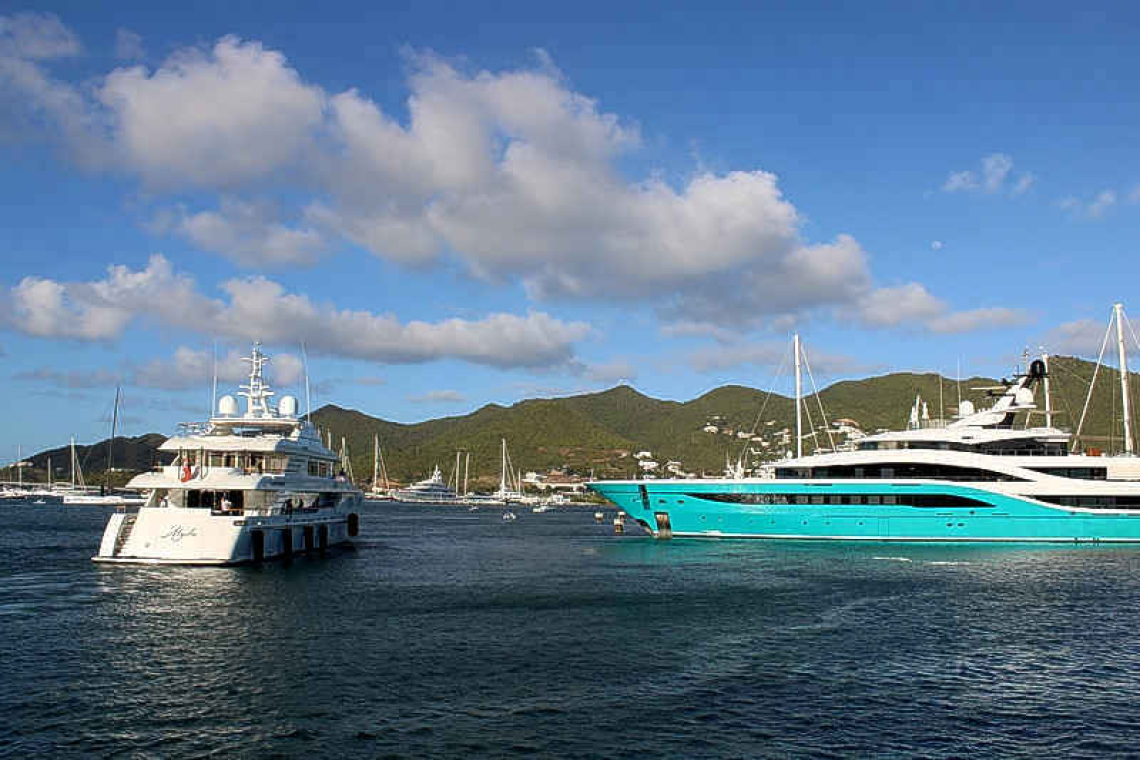The US $90 million super-yacht “Go” docked in Simpson Bay Lagoon during the pandemic. (File photo)
PHILIPSBURG--The Ministry of Tourism, Economic Affairs, Transport and Telecommunication (TEATT), St. Maarten Marine Trades Association (SMMTA) and St. Maarten Harbor Group are embarking on a crucial initiative to conduct an economic impact study of St. Maarten’s yachting and maritime sector.
Caretaker TEATT Minister Arthur Lambriex and SMMTA Chairman Jesse Peterson have formally reached out to the yachting industry to underscore the significance of St. Maarten as a prominent hub for yachting and maritime activities in the Caribbean.
This comprehensive study, spearheaded by EcoSustainAbility under the auspices of the TEATT Ministry, will span the next six months. It aims to delve into both the demand and supply sides of the sector, encompassing various vessel types such as super-yachts, charter boats, cruising yachts and racers, along with local charter boats, water sports, and dive operators. Collaborations with marinas, yacht agents, marine trades, services, and associated businesses will be pivotal on the supply side.
Moreover, the study will examine key events like the Heineken Regatta, Caribbean Multihull Challenge, Wahoo fishing tournament, and ARC Europe to provide a comprehensive analysis of the sector’s economic impact. Stakeholders are strongly encouraged to actively participate in interviews and questionnaires, facilitating the consulting team in engaging with yacht skippers and crew members. This collective effort aims to ensure an exhaustive and accurate assessment of the yachting and maritime sector’s economic contributions to St. Maarten’s economy.
In July 2021, in an interview with “The Daily Herald”, SMMTA pointed out that the government of St. Maarten is potentially missing out on millions of dollars in revenue from the yacht industry. Despite the global COVID-19 pandemic, the international yachting industry had grown in 2020 and steady growth was projected at a rate of 5.2% for 2021 to 2028.
St. Maarten is among the top destinations for super-yacht visits, with 43 mega-yachts docking in Simpson Bay Lagoon and Port St. Maarten in 2019, ranking the island sixth worldwide. According to SMMTA, it is estimated that the combined value of large and small yachts visiting the island during the November to May season exceeds US $5 billion.
Although current data on the size of St. Maarten’s yachting industry is not readily available, a 2012 survey revealed that the sector contributed more than US $300 million annually, representing 15% of the island’s gross domestic product (GDP). Since then, the sector has experienced remarkable growth.
Hurricane Irma unleashed total devastation on St. Maarten on September 6, 2017. Despite the widespread destruction, the marine sector remarkably rebounded swiftly, emerging as one of the leading economic pillars during the 2017-2018 season. While many land-based facilities struggled to repair in time for the season, marine businesses displayed remarkable resilience, swiftly bouncing back.
Similarly, amid the post-COVID economic recovery, the marine industry has played a pivotal role, driving economic activity during the spring and summer of 2020. It has also signalled a robust winter season ahead, contrasting with the subdued performance of many land-based businesses still striving to reach pre-pandemic levels.
In 2021, former SMMTA president Christopher Marshall emphasised the potential for significant growth in St. Maarten’s yachting sector. Marshall highlighted a widely-used calculation formula in the industry, indicating that approximately 10% of a yacht’s value is spent annually on maintenance and operation. With this in mind, Marshall emphasised the importance of increasing the time spent by yachts in St. Maarten to capture a larger share of this expenditure.
Marshall underscored the need for improvement and expansion of service offerings on the island to enhance competitiveness in the region. He pointed out that other islands, including those as far south as Grenada, have taken proactive measures to support their marine sectors. He highlighted the dedication of officials in Antigua and St. Kitts who have implemented laws and regulations to encourage investments in the yachting industry.
However, Marshall expressed concern that St. Maarten has not made similar efforts to support the sector. He emphasized the urgent need for swift and significant action to tap into this market potential, which could serve as a key economic driver for the island. He emphasised the importance of not only attracting sufficient spending, but also creating opportunities for highly-skilled employment and investing in training programmes to equip the local population with necessary skills.
An additional challenge arises from the absence of a uniform policy for boat-anchoring around the island. Yachts find anchoring significantly cheaper on the French side compared to the Dutch side, where cruisers can spend an extra US $500 on fees in a month. SMMTA has emphasised the need for a refreshed approach that will benefit the industry and, consequently, the entire island.







